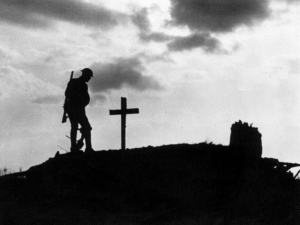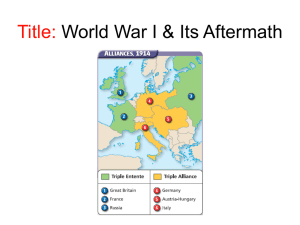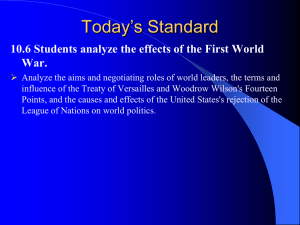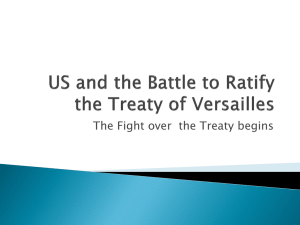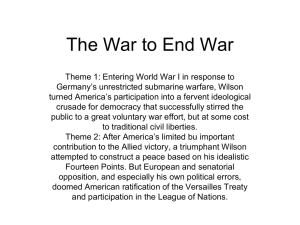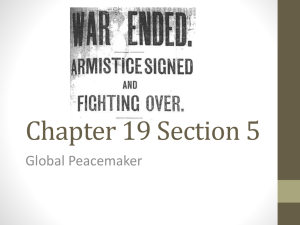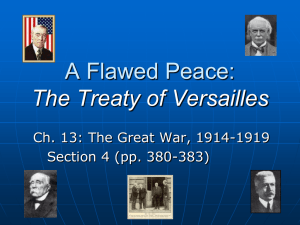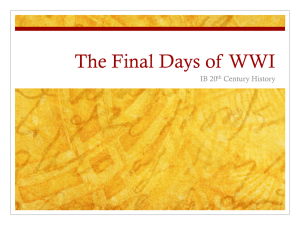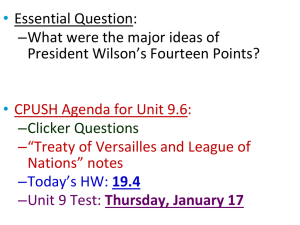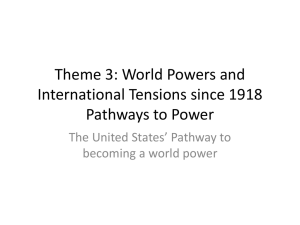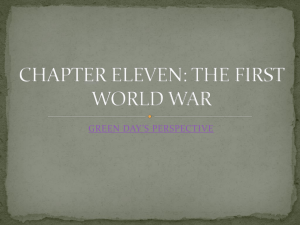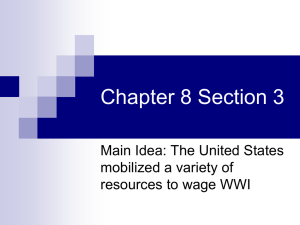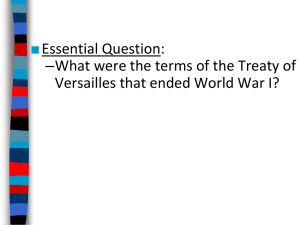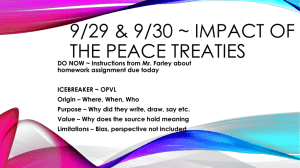Versailles - League of Nations
advertisement
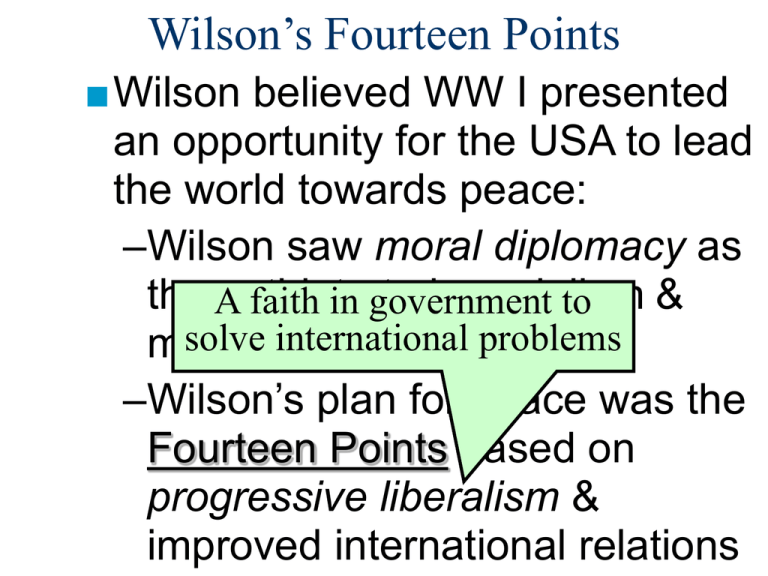
Wilson’s Fourteen Points ■Wilson believed WW I presented an opportunity for the USA to lead the world towards peace: –Wilson saw moral diplomacy as the A antidote to imperialism & faith in government to solve international problems military aggression –Wilson’s plan for peace was the Fourteen Points based on progressive liberalism & improved international relations Hungary TheAustria Treaty of Versailles Yugoslavia ■ Wilson’s Fourteen Points contained Poland Czechoslovakia Turkey3 main themes: –Creating new nations out of weakened empires based on “national self-determination” –New international rules: freedom of the seas, no more secret treaties, reduced militarism –Proposed a League of Nations to solve future problems Wilson made a mistake by not including Wilson’s Fourteen Points any key Republicans in his Paris delegation ■Wilson traveled to the Paris Peace Conference in 1919 to help create the Treaty of Versailles: –He hoped his Fourteen Points would become the framework for the peace treaty –But he realized the need to compromise other issues if he wanted a League of Nations Major Provisions of the Treaty of Versailles The Treaty of Paris, 1919 ■The treaty was a compromise: –Poland, Czech, Yugoslavia Wilson originally hoped for awere “peace without victory” formed but Germany’s colonies were split up by the victors –Germany had to accept the “war guilt clause” & pay $33 billion –The treaty did not mention free trade or freedom of seas –Despite calls for open covenants, the treaty was drafted in secret Europe Europebefore after the the war war New countries! Divided empires! New countries! New countries! New countries! New countries! Divided empires! New countries! Russia turns Communist (USSR) A Peace Articleof 10Paris The the Members of theconsisted League undertake ■But, “Big Four” agreed to “Big Executive Council of the toFour,” respect & preserve as against external Japan, & 4 other elected nations Wilson’s League of Nations: aggression the territorial integrity and –Created a General Assembly existing political independence of all of Members the League.Council 27 nations & of Executive In case of any such aggression or in –Acase Court ofthreat International Justice of any or danger of such aggression the shall sanctions advise –Arbitration & Council economic upon the means by which this obligation would be used to settle conflicts shall be fulfilled. against nations that resort to war –Article X asked nations to protect each other’s independence ■On June 28, 1919, the Treaty of Versailles was signed by Germany & officially ended WW I A Peace at Paris ■All the major European powers signed the treaty & joined the League but not the U.S. ■Polls showed U.S. support for the treaty, but the Senate wanted to amend the League’s covenant to keep the U.S. from begin forced to fight foreign wars ■Wilson refused to compromise & weaken the League of Nations Rejection in the Senate ■ 2/3 of the Senate was needed for the U.S. to approve the treaty: –The “mild reservationists” wanted changes to slightly weaken the League –The “strong reservationists” led by Henry Cabot Lodge wanted major changes to Article X –The “irreconcilables” refused to allow the U.S. to join the League Rejection in the Senate Like he did at the Paris ■Senate Majority Leader Lodge led Peace Conference the attack on the treaty & League: –Instead of compromising, Wilson tried to pressure the Senate with the rest of his presidency, aFor cross-country speakingEdith tour Wilson served as de facto president –The tour was popular but ineffective in pressuring Lodge –During the tour, Wilson had a stroke & remained bed-ridden Rejection in the Senate ■Wilson’s failure to compromise led the “irreconcilables” & “strong reservations” to defeat the treaty ■The United States never signed “Compromise? Let Lodge compromise… Better the Treaty of Versailles nor joined a thousand times to go down fighting than to dip League of Nationscompromise.” yourthe colors to a dishonorable —Woodrow Wilson ■In 1920, the Republican Warren Harding won in a landslide signaling a “return to normalcy” The League of Nations (Such as it is…) ■ The League of Nations was formed in early 1920s ■ But almost nothing like the organization that Wilson had dreamed up and fought for ■ No USA, no Soviet Union, no Germany ■ Result: Very little teeth, very little authority to do anything Members of the League of Nations U.S. signed its own peace treaty with Germany in 1921 Conclusions: Post-War Disillusionment The Postwar war killed Disillusionment “something precious ■The impact the GreatinWar: and perhapsofirretrievable the hearts of thinking men and women.” –The U.S. played a key role the international peace process A promise “not of heroics but –Led to unprecedented economic healing; not nostrums but normalcy; prosperity & gov’t involvement not revolutions but restoration.” but killed Progressivism –To the next generation, the war seemed futile & wasteful –Americans welcomed President Harding’s return to “normalcy” US International Involvement ■ Claimed to be “isolationist” ■ In reality, quite heavily involved in world affairs ■ Economically: Has lent, continues to lend money to Europe ■ Also helps to re-negotiate the terms of German reparations ■ Diplomatically: Helps to reduce naval armaments at Washington Conference ■ Kellogg-Briand Pact (1928): Pledges nations of the world to renounce war forever On to the “Roaring Twenties” ■ Kellogg-Briand Pact symbolizes the supreme optimism of the 1920s ■ Optimism + prosperity = The Roaring Twenties One Perspective from 1941 ■ In 1919 we had a golden opportunity, an opportunity unprecedented in all history, to assume the leadership of the world—a golden opportunity handed to us on the proverbial silver platter. We did not understand that opportunity. Wilson mishandled it. We rejected it. The opportunity perished. We bungled it in the 1920s and in the confusions of the 1930s we killed it.” Henry Luce, “The American Century”

